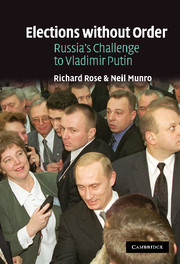Book contents
- Frontmatter
- Contents
- List of figures
- List of tables
- Introduction. The reality of Russia
- 1 A disorderly legacy
- 2 Democratization backwards
- 3 What Russians have made of transformation
- 4 Presidential succession: a Family problem
- 5 Parties without accountability
- 6 A floating system of parties
- 7 Impact of transformation on Duma voters
- 8 From acting to elected president
- 9 Campaigning and governing
- 10 In search of an equilibrium
- Appendix A New Russia Barometer samples
- Appendix B Coding of independent variables
- References
- Index
3 - What Russians have made of transformation
Published online by Cambridge University Press: 22 September 2009
- Frontmatter
- Contents
- List of figures
- List of tables
- Introduction. The reality of Russia
- 1 A disorderly legacy
- 2 Democratization backwards
- 3 What Russians have made of transformation
- 4 Presidential succession: a Family problem
- 5 Parties without accountability
- 6 A floating system of parties
- 7 Impact of transformation on Duma voters
- 8 From acting to elected president
- 9 Campaigning and governing
- 10 In search of an equilibrium
- Appendix A New Russia Barometer samples
- Appendix B Coding of independent variables
- References
- Index
Summary
Russians have always lived in a very political economy. In the Soviet era political decisions were all-important, for the economy was subordinate to commands of the party-state. Decisions about where you worked, where you lived, and what you could buy were taken by public officials in the first instance. Few Russians could afford to appear apolitical, as the Communist Party regarded this as a political act. The turbulent transformation of a command economy into an imperfect market economy has forced every household to think afresh about politics and economics.
In Soviet times it was impossible to know whether there was a match between what the party-state supplied and what people wanted. As long as citizens complied with its demands, the party-state maintained its equilibrium. Thanks to the freedom of the Russian Federation, the old regime can now be evaluated retrospectively. Hence, this chapter's first section asks: how good were the old Soviet days – at the time and in retrospect?
The transformation of Russian society has given Russians such unaccustomed boons as being free to say what they think or, even better, to ignore politics and get on with their own lives without regard to what the party thinks. Insecurity has also increased. Russians have been shocked to find that the rubles they had saved when goods were in short supply can no longer buy goods now on offer in the market economy, because inflation has increased prices thousands of times.
- Type
- Chapter
- Information
- Elections without OrderRussia's Challenge to Vladimir Putin, pp. 61 - 81Publisher: Cambridge University PressPrint publication year: 2002



